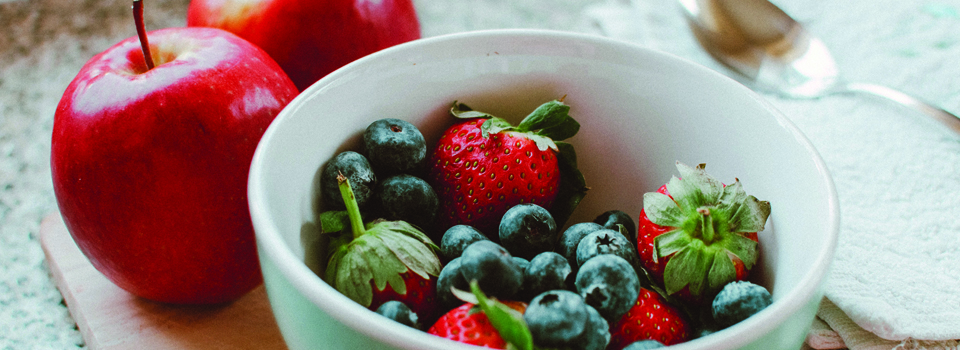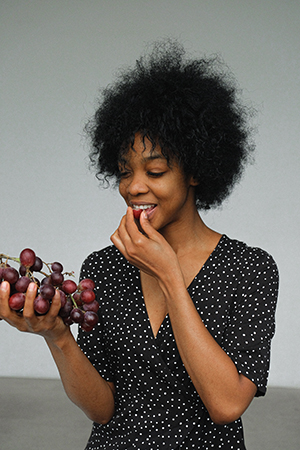
How Can Polyphenols Support Healthy Immunity
By Caitlin Beale, MS, RDN+
Polyphenols are active chemical compounds found in plant-based foods such as fruit, vegetables, or tea that provide health benefits. They are often the reason a plant will have a bright, vibrant color or give it a distinctly bitter flavor.
Interestingly, the function of polyphenols is to protect plants against potential threats from the outside world, such as ultraviolet radiation or pathogens.1 Luckily, we can use polyphenols to our advantage to support healthy cellular function and antioxidant defenses when we include them in our diet. 2
There are thousands of polyphenols, but some of the most common that you may have heard of include:34
•Stilbenesas found infoods likegrapes and berries.
•Flavonoids as found in foods like legumes, apples, onions, or leafy greens.
•Phenolic acids as found in foods like cocoa, spices, cherry, citrus, or broccoli.
•Tannins as found in coffee and tea.
Several other polyphenols don’t fall under these categories, some of which will be discussed below. And many plants include multiple types of polyphenols, adding even more benefits for our immune health and overall wellness.
How are Polyphenols Related to Immune Health?
Polyphenols appear to support both our innate and adaptive immune systems.5 Your innate immune response is the immediate first line of defense against pathogens.6It includes physical barriers like your skin, chemical, and cellular defenses.
The adaptive immune system is a learned, specific cellular response where your cells recognize a threat they’ve seen before and attack it.7 Both work together to keep you healthy.
Here are some of the ways polyphenols contribute to immune system support.
Gut Immune Health and Polyphenols
A critical piece of your immune health lies in your gut. The adaptive and innate immune response act via your intestinal mucosa, the immune cells that reside in your digestive tract, and through your microbiome (the beneficial microorganisms living in your gut). 8
As a result, your gut is considered a first line of defense against potential threats. Polyphenols can help support the health of your gut microbiome, interact with the immune cells found inside your gastrointestinal tract, and keep the intestinal cell wall healthy. 9
Polyphenols and your gut microbes have a bidirectional beneficial relationship.10 Your gut microbes can help metabolize polyphenols to make it easier for your body to absorb them.
But polyphenols give right back to your gut bacteria by acting as prebiotics. Prebiotics are fuel for your gut bacteria which support diversity and a healthy balance of beneficial bacteria. A well-balanced, healthy gut is foundational for a well-functioning immune system. 11
Polyphenols and Immune Signalling
Polyphenols can also directly impact the function of your immune cells. Individual polyphenols can bind to receptor sites on your immune cells and trigger a signaling pathway that affects how your immune system responds.12 In this way, polyphenols could help turn on the cells that help your immune system function to keep you well.
At the same time, certain polyphenols could help downregulate or turn off your immune system if it’s overreacting.13A healthy immune system is balanced, meaning it increases your immune response when needed, but returns to a state of equilibrium once the threat has passed. Polyphenols may support that balance.
Gene Expression and Polyphenols
Dietary interventions that involve polyphenols may also alter immune responses by impacting the expression of genes involved in the immune system. Research suggests that polyphenols may play a role in activating or deactivating genes through epigenetic regulation.14This means that polyphenols could change how your body reads and expresses DNA associated with your immune cells.
Polyphenols as Antioxidant Protection
Finally, polyphenols can help support the innate and adaptive immune systems through antioxidant activity.15 Antioxidants are vital to cellular health because they act as free radical scavengers. Free radicals are highly reactive molecules that can cause cellular damage and increase oxidative stress in the body if left unchecked.

How can you add more polyphenols to your diet?
When it comes to adding polyphenols to your diet, the possibilities are endless. There are so many different fantastic types to choose from, but here are a few choices of foods or specific polyphenols that are well-backed in research. You can also find many of these options in supplemental form if you aren’t getting enough in your diet:
• Cocoa. If you needed an excuse to eat more chocolate, here it is. Cocoa is filled with multiple types of polyphenols, including catechins, flavonols, anthocyanins, and procyanidins. 16
Cocoa could influence your immune system via intestinal and systemic immune responses. Some studies show it supports the production of healthy antibodies and immune cells. It also may help regulate IgA secretion, an antibody found in your gut that helps keep your intestinal mucosa and bacteria healthy.17 The antioxidants found in dark chocolate also support cellular health. 18
• Resveratrol. You may have heard about this polyphenol in discussions about the health benefits of red wine. Found in foods like grapes, blueberries, and rhubarb, resveratrol is thought to support both branches of your immune system through immune cell regulation and gene expression. It also could support a healthy immune process. 19
• Curcumin. Curcumin is one of the active compounds in the spice turmeric and gives it a bright yellow color.20 The immune-supporting benefits of curcumin are due to its influence on immune cells. It may help regulate immune-activating cells, therefore keeping the immune response in a healthy balance. 21
• Cranberry. Cranberry contains proanthocyanidins which are a type of flavanoid. Cranberry is well-researched for its support for healthy urinary function because it can interfere with the ability of bacteria to attach to the bladder wall. 22
It’s also is associated with healthy blood sugar balance, which is essential for immune health.23 Over time, blood sugar dysregulation could interrupt healthy immune function by interfering with the normal function of immune cells. 24
• Green tea extract. Green tea contains several beneficial flavonoids, including epigallocatechin 3-gallate (EGCG).EGCG has been widely studied and found to have potent antioxidant and health-promoting benefits.25 It helps to promote healthy cellular defenses through antioxidant support that even supports healthy skin. 26
• Quercitin. Quercitin is another type of flavonoid found in apple, honey, onion, and citrus fruits. Its primary benefits stem from antioxidant support that helps keep free radicals from causing oxidative damage to cells.27 28 It also may help block enzymes that contribute to a heightened immune response, keeping your immune system
• functioning normally. 29

Add More Polyphenols for Optimal Health
Polyphenols are unique health-promoting chemical compounds found in plants. By including more polyphenols in your diet, you can help keep your immune system balanced and working optimally to keep you healthy.
Eating a wide range of brightly colored fruits and vegetables, sipping green tea, or adding a daily square of dark chocolate are all simple and delicious ways you can increase your intake of polyphenols. Many of these supplements are also available in supplemental form to further support your immune system for optimal wellness.
.
.
Caitlin Beale, MS, RDN is a registered dietitian and freelance health writer. She has a master’s degree in nutrition and over ten years of experience as a registered dietitian. You can learn more about Caitlin Beale, MS, RDN at www.caitlinbealewellness.com.
+The views expressed in this article are those of the authors. They do not reflect the opinions or views of Pure Encapsulations®.
1 Hussain T, Tan B, Yin Y, Blachier F, Tossou MC, Rahu N. Oxidative Stress and Inflammation: What Polyphenols Can Do for Us?. Oxid Med Cell Longev. 2016;2016:7432797. doi:10.1155/2016/7432797
2 Kim HS, Quon MJ, Kim JA. New insights into the mechanisms of polyphenols beyond antioxidant properties; lessons from the green tea polyphenol, epigallocatechin 3-gallate.Redox Biol. 2014;2:187-195. Published 2014 Jan 10. doi:10.1016/j.redox.2013.12.022
3 Tsao R. Chemistry and biochemistry of dietary polyphenols. Nutrients. 2010;2(12):1231-1246. doi:10.3390/nu2121231
4 Durazzo A, Lucarini M, Souto EB, et al. Polyphenols: A concise overview on the chemistry, occurrence, and human health. Phytother Res. 2019;33(9):2221-2243. doi:10.1002/ptr.6419
5 Shakoor H, Feehan J, Apostolopoulos V, et al. Immunomodulatory Effects of Dietary Polyphenols .Nutrients. 2021;13(3):728. Published 2021 Feb 25. doi:10.3390/nu13030728
6 Biron, Christine A. “Chapter 4 -Innate Immunity: Recognizing and Responding to Foreign Invaders—No Training Needed.” In Viral Pathogenesis (Third Edition), edited by Michael G. Katze, Marcus J. Korth, G. Lynn Law, and Neal Nathanson, 41–55. Boston: Academic Press, 2016. https://doi.org/10.1016/B978-0-12-800964-2.00004-5.
7 Moticka, Edward J. “Chapter 2 -Hallmarks of the Adaptive Immune Responses.” In A Historical Perspective on Evidence-Based Immunology, edited by Edward J. Moticka, 9–19. Amsterdam: Elsevier, 2016. https://doi.org/10.1016/B978-0-12-398381-7.00002-2.
8 Hachimura S, Totsuka M, Hosono A. Immunomodulation by food: impact on gut immunity and immune cell function. Biosci Biotechnol Biochem. 2018;82(4):584-599. doi:10.1080/09168451.2018.1433017
9 Shimizu M. Multifunctions of dietary polyphenols in the regulation of intestinal inflammation. J Food Drug Anal. 2017;25(1):93-99. doi:10.1016/j.jfda.2016.12.003
10 Corrêa TAF, Rogero MM, Hassimotto NMA, Lajolo FM. Front Nutr. 2019;6:188. Published 2019 Dec 20. doi:10.3389/fnut.2019.00188
11 Wu HJ, Wu E. The role of gut microbiota in immune homeostasis and autoimmunity. Gut Microbes. 2012;3(1):4-14. doi:10.4161/gmic.19320
12 Burkard M, Leischner C, Lauer UM, Busch C, Venturelli S, Frank J. J Nutr Biochem. 2017;46:1-12. doi:10.1016/j.jnutbio.2017.01.006
13 Maeda-Yamamoto M. Curr Pharm Des. 2013;19(34):6148-6155. doi:10.2174/1381612811319340009
14 Ding S, Jiang H, Fang J. Regulation of Immune Function by Polyphenols. J Immunol Res. 2018;2018:1264074. Published 2018 Apr 12. doi:10.1155/2018/1264074
15 Neyestani, Tirang R. “Polyphenols and Immunity.” In Wild-Type Food in Health Promotion and Disease Prevention: The Columbus Concept, 413–34, 2008. https://doi.org/10.1007/978-1-59745-330-1_28.
16 Rimbach G, Melchin M, Moehring J, Wagner AE. Polyphenols from cocoa and vascular health-a critical review. Int J Mol Sci. 2009;10(10):4290-4309. Published 2009 Nov 20. doi:10.3390/ijms10104290
17 Pérez-Cano FJ, Massot-Cladera M, Franch A, Castellote C, Castell M. The effects of cocoa on the immune system. Front Pharmacol. 2013;4:71. Published 2013 Jun 4. doi:10.3389/fphar.2013.00071
18 Magrone T, Russo MA, Jirillo E. Cocoa and Dark Chocolate Polyphenols: From Biology to Clinical Applications. Front Immunol. 2017;8:677. Published 2017 Jun 9. doi:10.3389/fimmu.2017.0067
19 Malaguarnera L. Influence of Resveratrol on the Immune Response. Nutrients. 2019;11(5):946. Published 2019 Apr 26. doi:10.3390/nu11050946
20 Catanzaro M, Corsini E, Rosini M, Racchi M, Lanni C. Immunomodulators Inspired by Nature: A Review on Curcumin and Echinacea. Molecules. 2018;23(11):2778. Published 2018 Oct 26. doi:10.3390/molecules23112778
21 Jagetia GC, Aggarwal BB. “Spicing up” of the immune system by curcumin. J Clin Immunol. 2007;27(1):19-35. doi:10.1007/s10875-006-9066-7
22 Stapleton AE.Evid Based Med. 2013;18(3):110-111. doi:10.1136/eb-2012-100984
23 Rocha DMUP, Caldas APS, da Silva BP, Hermsdorff HHM, Alfenas RCG.Crit Rev Food Sci Nutr. 2019;59(11):1816-1828. doi:10.1080/10408398.2018.1430019
24 Berbudi A, Rahmadika N, Tjahjadi AI, Ruslami R. Curr Diabetes Rev. 2020;16(5):442-449. doi:10.2174/1573399815666191024085838
25 Chacko SM, Thambi PT, Kuttan R, Nishigaki I. Beneficial effects of green tea: a literature review. Chin Med. 2010;5:13. Published 2010 Apr 6. doi:10.1186/1749-8546-5-13
26 Roh E, Kim JE, Kwon JY, et al. Molecular mechanisms of green tea polyphenols with protective effects against skin photoaging.Crit Rev Food Sci Nutr. 2017;57(8):1631-1637. doi:10.1080/10408398.2014.1003365
27 Xu D, Hu MJ, Wang YQ, Cui YL. Antioxidant Activities of Quercetin and Its Complexes for Medicinal Application. Molecules. 2019;24(6):1123. Published 2019 Mar 21. doi:10.3390/molecules24061123
28 Boots AW, Haenen GR, Bast A. Health effects of quercetin: from antioxidant to nutraceutical.Eur J Pharmacol. 2008;585(2-3):325-337. doi:10.1016/j.ejphar.2008.03.008
29 Mlcek J, Jurikova T, Skrovankova S, Sochor J. Quercetin and Its Anti-Allergic Immune Response. Molecules. 2016;21(5):623. Published 2016 May 12. doi:10.3390/molecules21050623


 Facebook
Facebook Instagram
Instagram